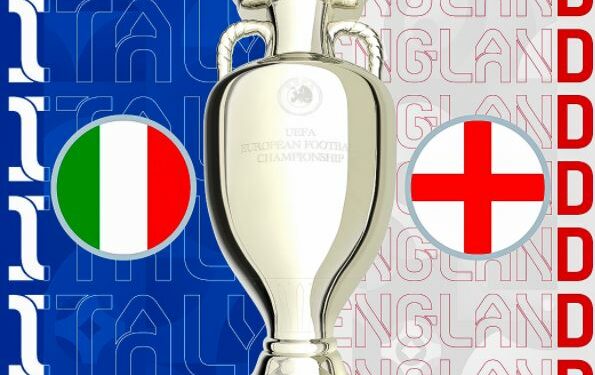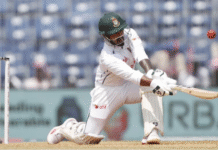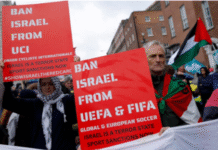
Image credits – UEFA EURO 2020 @EURO2020 / Twitter
July 10 (AFP) – England and Italy are holding their collective breath as the clock counts down to Sunday’s Euro 2020 final showdown which will be watched by around 65,000 fans at Wembley and millions more on television.
The anticipation is great in England, as the hosts sense that this is their time to end a 55-year wait to add a second major trophy to their 1966 World Cup.
Wembley was the venue for that final and will be again on Sunday as Gareth Southgate’s England seek to complete the job after edging out Denmark 2-1 in extra time in front of 64,950 supporters in Wednesday’s semi-final.
England began the tournament as one of several contenders to lift the trophy but have taken advantage of playing most of their games at home.The final will be their sixth match at Wembley out of their seven.
“It’s huge, with the final being at Wembley as well it’s even more special, something we could have only dreamt of at the start of the tournament,” defender John Stones said on Friday.
“We’ve got this far now and we’ve grown throughout the tournament and not put too much pressure on ourselves. We’ve overcome some tough tests over the last few years.”
– Previous meetings –
England have never beaten Italy at a major tournament, although meetings between the nations have been few and far between.
Italy triumphed in a penalty shoot-out in the quarter-finals of Euro 2012 in Ukraine and won 2-1 when they met in the group stage of the 2014 World Cup, although both sides ended up being eliminated in the first round.
Both teams have been transformed since then.
The Azzurri have lit up Euro 2020 ever since beating Turkey 3-0 in the opening game a month ago.
They are on a national record 33-match unbeaten run under coach Roberto Mancini, who has spent time in England both as a player and as a manager.
This will be their third game of the tournament at Wembley, where they beat Austria 2-1 in extra time in the last 16 and Spain on penalties in a brilliant semi-final on Tuesday.
“Playing at their home does not scare us,” Italy’s veteran defender Leonardo Bonucci said on Friday.
“We are looking forward to taking to the field even though most of the fans present will be English. We want to do something historic, have a great performance and then we’ll see how it ends.”
Italy had the backing of around 11,000 UK-based fans at the semi-final and their supporters will once again be there for the final.
Reports in Italy said that 6,500 tickets had been sold to fans already in Britain and that number would be bolstered by 1,000 more who will fly into the country especially for the game.
Italy’s President, Sergio Mattarella, will be there too.
– Long wait for Azzurri too –
The Azzurri are also looking to end a long wait to win the European Championship. The four-time World Cup winners have been continental champions just once, when it was just a four-team event back in 1968.
Since then they have reached two finals, losing to France in 2000 and to Spain in 2012. Sunday’s game will be their 10th major tournament final.
Mancini has been praised for the job he has done since taking over in 2018 in the aftermath of Italy’s failure to qualify for that year’s World Cup.
“Beyond the players, I’d say that everything comes from Mancini who knows how to make the right choices,” Italy legend Dino Zoff told AFP.
“For me, it’s not a surprise to see Italy in the final. I was convinced they’d do well.”
British Prime Minister Boris Johnson was among those at England’s semi-final along with Prince William, who is president of the English Football Association.
Johnson, who initially refused to condemn fans for booing the England team while they took the knee earlier in the tournament, has not ruled out the prospect of an ’emergency’ public holiday should England triumph on Sunday.
Meanwhile, UEFA on Friday ordered Hungary to play their next three home matches behind closed doors and fined the Hungarian football federation 100,000 euros ($118,000) for “the discriminatory behaviour of its supporters” at the Euro.
European football’s governing body had opened an investigation into alleged homophobic banners and monkey noises during Hungary’s group-stage matches in Budapest and Munich.









